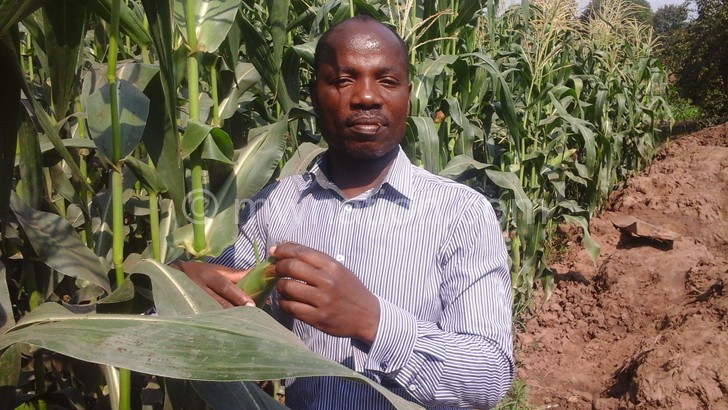One family’s struggle against hunger
As the country grapples with biting food woes, exploits of an adventurous farming family affirm lucky are those migrating from widespread anxiety to transformative action. JAMES CHAVULA writes.
In Karonga, it is no secret many households face a bleak food situation this year.

For many farming households, the main question recurs: What shall we turn to when the lean period comes?
The question is neither peculiar nor unfounded. It is the question on the minds of 1.5 million Malawians who face a spectre of starvation as maize harvests have gone down by nearly 30 bags in every 100 due to floods and dry spells.
“It is counter-productive until we start asking ourselves: what can we do to overcome the food tragedy that has befallen the country?” says Fyaupi Mwahimba.
From self-interrogation to life-changing action, Mwahimba is a living example of how irrigation can transform the livelihoods of poor populations hit by hunger amid climate change.
In their village, the most touching encounters are not the lamentations of the people facing looming hunger. It is, actually, the Mwahimbas’ healthy maize crop. Their admirers prefer calling the 3.9 hectares of winter cropping ‘green belt’. This maybe in reference to a massively publicised irrigation project former president the late Bingu wa Mutharika envisaged turning lakeshore and riverside localities into agricultural production zones.
Mwahimba shows the green belt is possible.
“I didn’t need any prompting. When the erratic rains transitioned to lengthy dry spells, I knew we will be in trouble unless we did something to avert the looming disaster,” he says.
The farmer’s wife concurs.
“It all started in December when rice and maize were being scorched by dry spells. We had to choose between staying put and doing something,” she says.
Their choice was largely inspired by a burning desire to safeguard the wellbeing of the family comprising two wives and eight children, said the man.
However, they set out to take on board interested farmers from the locality and surrounding villages. Many turned down the opportunity and the few dropped out when maize was just a knee-high due to huge costs of farm inputs, lack of know-how and destruction caused by livestock.
Spiritedly going, the Mwahimba decided to go it alone.
In the thick of winter cropping, the main tool was a K150 000 ($264) water pump that consumes five litres of fuel a day.
Mwahimba says: “Those that solely depend on rain-fed agriculture amid erratic rains need an awakening.”
According to him, the success story is being bankrolled by proceeds from a family restaurant at Karonga Boma.
Also instrumental to the ‘greenbelt’ on both sides of a dyke which empties water from the flood-prone Rukuru River is manure from cows, goats and pigs in the Mwahimbas homestead.
The story of determination has caught the eye of Karonga agricultural development division (Kraad). Crop officer Zikonjani Chivunga wants people to emulate the Mwahimbas’ example to beat hunger and poverty.
“It’s admirable that as soon as he saw problems approaching, he chose to take necessary action to save the situation,” says the agricultural official.
He asked farmers to work together, saying a united force will help the do more, better and faster.
The farmer has been working hand-in-hand with Kradd workforce to ensure the green miracle comes to fruition.
When asked what lies ahead, he pauses for a deep thought.
“I will keep the maize for sale around January or February when hunger bites hard to make a lot of profit.”
For him, agriculture is obviously not just a way of life, but business.
Looking forward, he says: “I want to invest part of the profit in constructing a decent house and the moulding of bricks is already underway.”
He says he wants to buy some more pipes to extend the irrigation system to Lake Malawi almost three kilometres away for more people to benefit.
To the farmer and the agricultural official, it is astonishing most Malawians endure chronic hunger when the country is endowed with lakes, rivers, valleys and marshes.
Until the country wakes up to exact its irrigation potential, they opine, songs of hunger will remain in the air.
Just this year, the country missed the Millennium Development Goal (MDG) target to eliminate hunger. Presently, government is importing about 100 000 metric tonnes of maize from Zambia and Tanzania to safeguard the population from hunger as official food estimates show maize harvests have slumped to nearly 2.9 million metric tonnes from nearly 3.9 million last year.
“Nobody will die of hunger this year,” president Peter Mutharika assured Malawians as early as April.
In July, Parliament authorised a K4 billion allocation for sourcing maize.
As truckloads of the scarce grain pour in, the Mwahimba family counts itself lucky, knowing uncertainties typical of long waits for relief maize and scrambles for grain rations in markets leave poor households poorer.





